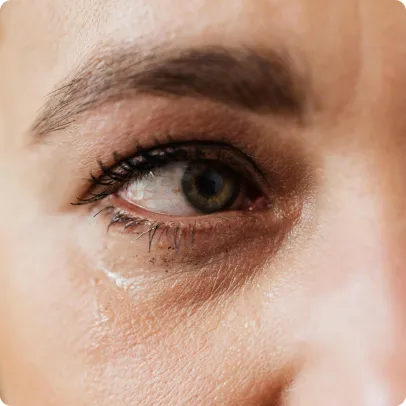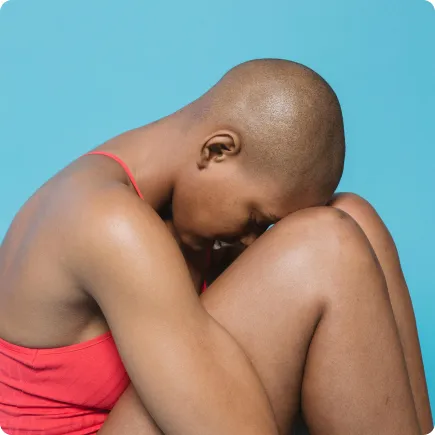
Menopause and Anxiety

What is anxiety in menopause?
Anxiety is commonly a feeling of fear, nervousness, or apprehension that arises in response to stressful situations.
It can manifest as uneasiness, tension, panic, terror, and dread, accompanied by physical symptoms like a racing heart, rapid breathing, sweating, trembling, muscle weakness, and stomach issues.
Prolonged anxiousness that disrupts daily functioning may indicate an anxiety disorder experienced by 30% of adults. Anxiety disorders are often associated with depression and can be treated with medical and non-medical interventions, including medication, psychotherapy, and hormone therapy for menopausal individuals.
If you are in crisis, please call 988 for the Suicide and Crisis Lifeline or text HOME to 741741 to reach the Crisis Text Line. You are not alone, and there is help available.
What causes anxiety in menopause?
Research shows that the decline in estrogen levels during menopause can disrupt the delicate balance of neurotransmitters in the brain, such as serotonin and norepinephrine, which are crucial for mood regulation.
Reduced estrogen levels have been associated with an increased vulnerability to depressive symptoms, including feelings of sadness, loss of interest, and a lack of pleasure in activities that were once enjoyed. Additionally, research indicates that women experiencing menopause-related anxiety may have higher levels of stress hormones, such as cortisol, which can further feelings of restlessness, irritability, and heightened anxiety.
It is worth noting that while hormonal changes play a significant role, other factors also contribute to the development or intensification of depression, anxiety, and mood swings during menopause. Psychosocial factors, including life stressors, personal and family history of mental health conditions, and societal expectations surrounding aging and menopause, can influence a woman's emotional well-being during this phase of life.
of Members report symptom improvement within 3 months.
care at your fingertips.

What is going on inside your body?
Anxiety is how the body prepares to respond to a stressful situation or threat. For a short while, your heart races, blood rushes to your brain, your blood pressure spikes, and your breathing becomes faster.
As women go through the menopausal journey, they experience a decline in estrogen levels that can disrupt the delicate balance in the brain.
Reduced estrogen levels have been associated with increased feelings of anxiousness. Research has linked estrogen in the brain to increased serotonin, the production of endorphins, and the protection and growth of neurons. These effects may change as estrogen levels drop.
How is your menopausal anxiety diagnosed?
Once you are paired with your provider, they will diagnose you based on the description of your symptoms.
What are some medical-provider-prescribed treatments for menopausal anxiety?
Hormone Replacement Therapy: By restoring estrogen levels, this type of therapy can help treat emotional changes, including anxiety.
Antidepressants: Selective serotonin reuptake inhibitors (SSRIs) are the most commonly used antidepressants; they increase the amount of serotonin in the brain, improve mood, and reduce anxiety.
Benzodiazepines: This drug temporarily relieves anxiety disorders by calming the nervous system. They work more quickly than antidepressants but are habit-forming, and some people build up a tolerance to them.
Buspirone: This is another anti-anxiety medication specifically for treating chronic anxiety.
Beta Blockers: This type of blood pressure medication can be used occasionally for the physical symptoms of anxiety: fast heart rate, sweating, and trembling. They prevent adrenaline from acting on beta receptors in the heart, which prevents the heart from racing.
of Members report symptom improvement within 3 months.
care at your fingertips.

What are some non-medical treatments for anxiety during menopause?
Psychotherapy is a standard and effective treatment for anxiety disorders and is often used alongside medication.
Cognitive-behavioral therapy (CBT): This form of talk therapy focuses on changing thought and behavior patterns, helping patients see anxiety-inducing situations more clearly and respond to them more healthily.
Exposure therapy: This type of CBT involves exposing a person to the thing or situation that triggers anxiety to change how they respond to it.
If you are in crisis, please call 988 for the Suicide and Crisis Lifeline or text HOME to 741741 to reach the Crisis Text Line. You are not alone, and there is help available.
Non-psychotherapy interventions can also help manage and cope with anxiety during menopause.
Deep breathing: Taking slow, deep breaths and focusing on the breath help you disengage from troubling thoughts, reducing anxiety.
Mindfulness meditation: This involves focusing the mind on the present moment rather than the past or future. Some research has shown it helps reduce anxiety.
Exercise: Physical activity helps divert your attention and triggers chemical changes in the brain that keep anxiety at bay.
Yoga: This is another relaxation technique shown to promote general wellness, mood, mental, and emotional health, as well as manage anxiety symptoms.
What should you do next?
Let’s get you prepared to be paired with your provider!
Select and submit all of the symptoms you are currently experiencing so your doctor can assess and provide a tailored treatment plan for you.
We recommend Thrive Psychology, Grow Therapy, and Happier Living as mental health partners for additional support.
of Members report symptom improvement within 3 months.
care at your fingertips.

References
- A 2018 review in the journal Obstetrics and Gynecology Clinics of North America reported that anxiety tends to peak early in menopause, together with irritability and mood swings.
- A study published in the journal Menopause in 2012 found that women with low anxiety before menopause were more likely to report high anxiety during early and late perimenopause and postmenopause, while women who had high anxiety before menopause continued to experience high anxiety throughout these periods.
- A 2005 study in the same journal of women in midlife found that women with high anxiety are five times more likely to experience hot flashes than women with normal anxiety levels.




